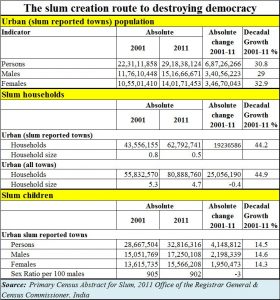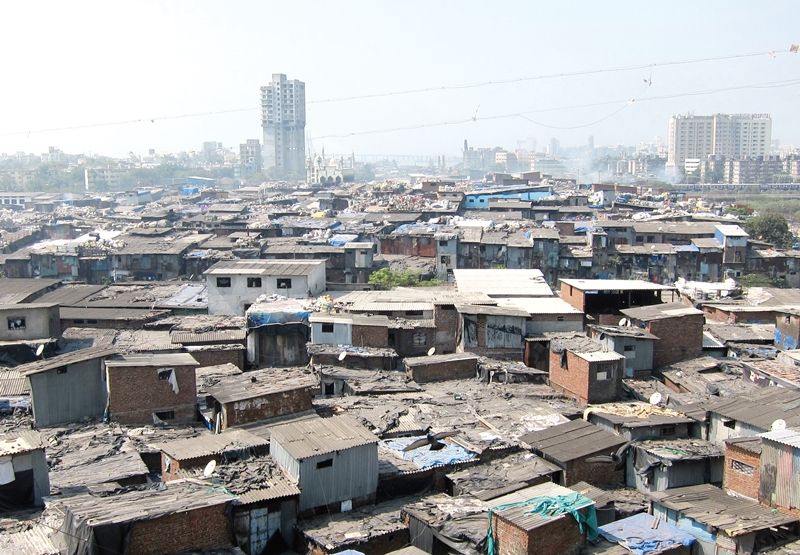http://www.freepressjournal.in/analysis/slums-show-disrespect-of-politicians-for-democracy-r-n-bhaskar/1358963
India’s slums reveal politicians’ contempt for democracy
— By | Sep 20, 2018
Legislators are supposed to uphold the Constitution. That includes a commitment to democracy, to free and fair elections. Unfortunately, India’s slums are testimony to the fact that politicians do not believe in free and fair elections. They believe in grabbing power, even if it means buying votes, or worse, marginalising other voters.
What is worse is that even while the government talks about expanding the taxpayers’ base, politicians have been trying to narrow the base of taxpayers by exempting slumdwellers from tax-payment obligations.
 Take the latest development. Last week the government of Maharashtra moved to modify some key rules relating to the acquisition of SRA [slum rehabilitation authority] flats. The government stated that a discount on SRA flats will henceforth be available for ineligible slum-dwellers as well. That move is illegal and even unconstitutional.
Take the latest development. Last week the government of Maharashtra moved to modify some key rules relating to the acquisition of SRA [slum rehabilitation authority] flats. The government stated that a discount on SRA flats will henceforth be available for ineligible slum-dwellers as well. That move is illegal and even unconstitutional.
First, SRA flats are meant to rehabilitate registered slumdwellers, not others. Second, by including non-registered slumdwellers, the government is worsening the allotment chances for registered slumdwellers. It is worth remembering that the need for affordable housing is over 18.8 million (http://www.asiaconverge.com/2018/04/smiles-sorrows-world-bank-forecasts-india-gdp-rise-raises-unemployment-concerns/). Mumbai has over 5 million slumdwellers. The numbers of SRA flats constructed is not more than 15,000 a year. Extending the SRA-housing largesse to non-registered slumdwellers worsens the plight of registered slumdwellers. Moreover, law-abiding taxpayers pay for the SRA flats. Extending them to non-registered slumdwellers, adds to the tax burden.
To understand the magnitude of the slum scam, it is imperative to look at the Census of India figures (see chart). They show that the total number of reported slums increased from 1,743 in Census2001 to 2,613 in Census 2011. One can be certain that this number will rise even further in Census 2021.
The Census authorities give four probable reasons (http://www.censusindia.gov.in/2011-Documents/Slum-26-09-13.pdf) for the surge in numbers:
- urbanization,
- industrialization,
- higher economic growth in cities makes them attractive.
- cities represent a higher standard of living
But the Census ignores the fifth and most important reason – that politicians abet slum formation. They nurture them. It allows them to change the demographic pattern in key constituencies, by marginalisig existing inhabitants in any given area.
Sounds farfetched? But that is precisely what the Census numbers show. First, watch the growth of slum population. It grew by 30.8% at a time when the national population growth was only 1.2% a year and the decadal growth was 17.64%. (http://censusindia.gov.in/2011-prov-results/data_files/india/Final_PPT_2011_chapter3.pdf) ). If cities attracted people from all over India, the numbers should have grown for non-slumdwellers as well. Something made migration more rewardoing and attractive for slumdwellers.
Then watch the growth in the number of households. This segment grew even faster – at 44.2% — than slum population Shocking!
Why? Simple answer: all slumdweller-benefits – subsidised electricity, water and even SRA flats – are given to households, not to individuals. So it makes sense for households to break up and create as many households as possible. You thus find more than one household staying within one room. That explains why the size of households in reported urban slums was less than one. Clearly, the same person had became part of two households! Laughable at one level. Tragic at another, because law-abiding tax payers paid for this fraud.
Take another indicator: the growth of children. This was lower than population growth, or even household growth. Why? The logical answer would be that children were sent away to their respective homes in villages. The people who stayed on were usually those who could vote. That is what protector politicians want.
So what is the way out? The courts will have to decide, because both the legislative and the executive classes have failed to protect the Constitution. The solution would be to deny voting rights to people who do not have a legal place of dwelling (http://www.asiaconverge.com/2018/05/citizenship-votebank-northeast-and-work-permits/). Once that happens, politicians will lose interest in creating slums. Existing populations will not get marginalised any more. Democracy – and equity – then have a chance of surviving in India
If that does not happen, expect politicians to grant more benefits to so-called slum-dwellers. They have already legalized the illegal occupation of public land. They are being given flats in the same place where slums exist, so that protector-politicians can preserve their votebanks. Politicians are now trying to exempt slumdwellers from paying property taxes too. This means that the remaining (legal) tax-paying people will have to pay additionally for the taxes on houses that slumdwellers are being given free of cost.
It is simpler – and cheaper – instead to stuff bogus ballot papers into ballot boxes.
This type of demographic tinkering must stop. Else, India will remain a democracy only in name. It will have more vote purchasing and demographic tinkering than any other democracy in the world.



































COMMENTS